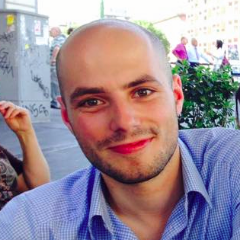Così fan tutte features the trials and tribulations of two sets of lovers, on whom the philosopher Don Alfonso tests his theory that “all women are the same”. The opera has been popular at La Scala, who in recent years have gone in for more traditional realisations in the form of Mauro Pagano's beautiful period productions. This time, however, they went for a reworking of the 2011 Salzburg Festival's modern production by Claus Guth, whose psychological style has become familiar to this audience through recent productions of Lohengrin and Die Frau ohne Schatten.
The curtain opens to a view of modernist chic with white, unadorned walls, cuboid furniture, bulbous champagne glasses and slatted stairs that lead to mezzanine and balcony for spatial definition. The silhouetted lovers assume static positions amongst assorted guests, and in the centre sits Don Alfonso in white dinner jacket, staring out to the audience with a malevolent air. With a click of his fingers, he sets the party in motion, and the lovers stumble around in gaudy dress and with drunken grimaces.
Alfonso is the controlling sorcerer who orchestrates much of what takes place on stage. With a swipe of his arm he manipulates the lovers into tangled embraces, with a click of his fingers he alters the lighting dramatically to shift us into new emotional territory. On the contrary, the lovers are anonymous figures who go about their lives with an unthinking, unfeeling inertia. The sisters sing of their love for Guglielmo and Ferrando whilst jumping on sofas like excited teenagers, and we are unable to buy into the sincerity of their chatter. Dorabella threatens to throw herself off the mezzanine in a moment of affected anguish (combined with morning-after hangover) following the news of her lover's departure. There is the suspicion that Guth is making a comment on the modern romantic experience, though we are never completely sure what he means to say.
Beautiful as it is, a persistent problem with this production is that it chokes the natural drama of Mozart's score with dense imagery and opaque symbolism. Hints at an enigmatic relationship between Alfonso and Despina are superfluous and burdensome to the main plot, and only absorb attention that could be better spent elsewhere. Fiordiligi is eventually conquered by the blond Albanian (Ferrando in disguise), and whilst they profess their love in the duet “Ah, che omai la mia costanza”, Mozart's turbulent score makes it clear that Fiordiligi still loves Guglielmo. Guth plays with this idea with the insertion of an apparition of Guglielmo who emerges on the balcony above the lovers and puts a gun to his head. This onerous imagery only clouds the bitter-sweet sublimity of the music.
At times I found myself tuning out of the stage-work and into that of the orchestra as if the former restricted enjoyment of the latter. Barenboim's broad treatment of the tempo won't have been to everyone's taste, but his rendering of the score was undeniably beautiful with a firm sound nevertheless full of flexible nuance. In “Soave sia il vento”, silvery glows breached to the strings' surging waves, whilst the preceding “Bella vita militar” stirred a whirlwind of energy, to which a robust chorus contributed from the wings.
Odd moments of opera buffa silliness shone through to release the rippling tonic of laughter around the theatre, and one good moment was the "magnet therapy" that follows the Albanians' feigned suicide. Despina manipulates their legs into amusing contortions, whilst Ferrando's failed attempts to escape his tormentor were classic "buffa" material. These antics provided welcome relief from the heavier portions of the production.
Serena Malfi's feisty Despina was well sung despite a hint of nasality, and in “In uomini, in soldati” she displayed a weightier sound that lent a sassy blossom. Katija Dragojevic struggled to make an impact as Dorabella, and Maria Bengtsson's Fiordiligi was sometimes plastic in the recitative, though she sang with an attractive tenderness that captured the sentimentality of some of Mozart's arias.
Rolando Villazón fared badly in the bear pit of the Teatro alla Scala, and received curtain call boos for his realisation of Ferrando. His voice tightened as he struggled through the signature “Un'aura amorosa”, and there was a telling 'dead' quality to his sound. The biggest cheers were saved for Adam Plachetka and Michele Pertusi who were magnificent in their respective roles. Petrusi oozed gravitas as the sauntering Alfonso, whilst Plachetka's Guglielmo possessed a burnished voice which was balanced from top to bottom. Also impressive was the baritone's recitative, which displayed emotive intensity through razor-sharp Italian.
The sextet come together for the finale, where Mozart has the lovers marry their original partners before urging us to be be accepting of the cards that life deals. In this production, however, the lovers fall about the stage with a sense of despondence, thus underlining the irreversible damage caused by their actions. Such fatalism is perhaps more believable than Mozart's ending, though it does feel slightly out of touch with the nature of his drama.




